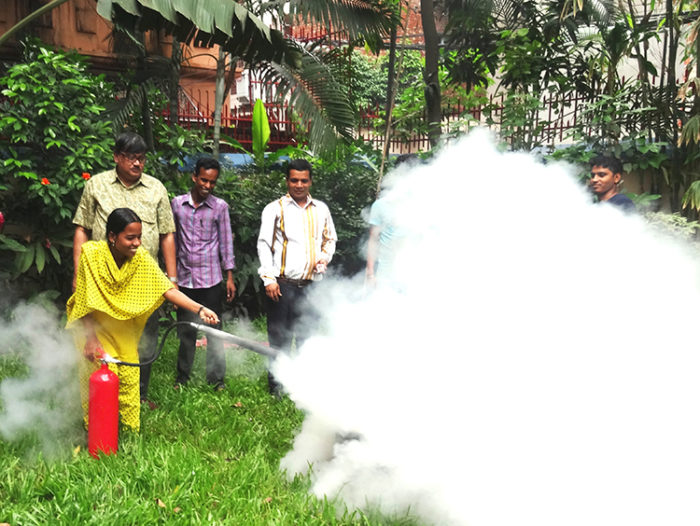An Effective Union Can Ensure Fire Safety
Bilkish Begum says she and other workers at a garment factory in Bangladesh could not discuss implementing fire safety measures with their employer – even after the deadly blaze at Tazreen Fashions factory killed 112 workers three years ago. Only when they formed a union, which provides workers with protection against retaliation for seeking to improve their workplace conditions, could they take steps to help ensure their safety.
“Things have improved a lot regarding fire safety once we formed union as now we have the power to raise our voice,” she says.
Bilkish, 30, now a leader of a factory union affiliated with the Sommilito Garments Sramik Federation (SGSF), is among hundreds of garment workers who have taken part in Solidarity Center fire safety trainings this year. The Solidarity Center works with garment workers, union leaders and factory management to improve fire safety conditions in Bangladesh’s ready-made garment industry through such hands-on courses as the 10-week Fire and Building Safety Resource Person Certification Training.
“I used to be afraid about fire eruption in my factory,” Bilkish says. “But after attending trainings, I feel that if we work together, we can reduce risk of fire in our factory.”
Fire remains a significant hazard in Bangladesh factories. Since the Tazreen fire, some 34 workers have died and at least 985 workers have been injured in 91 fire incidents, according to data collected by Solidarity Center staff in Dhaka, the capital. Incidents resulting in injuries include at least eight false alarms.
In January, after a short-circuit caused a generator to explode at one garment factory, Osman, president of the factory union and Popi Akter, another union leader, quickly addressed the fire and calmed panicked workers using the skills they learned through the Solidarity Center fire training. They also worked with factory management to correct other safety issues, like blocked aisles and stairwells cramped with flammable material.
Many workers who have taken part in the trainings say they are equipped to handle fire accidents.
“We are now confident after the training that we can help factory management and other workers if there is any incident of fire in our factory,” says Mosammat Doli, 35, a leader of a union affiliated with the Bangladesh Garment and Industrial Workers’ Federation (BGIWF). “From my experience at my factory, I have seen that an effective trade union can ensure fire safety in the factory as it can raise safety concerns,” he said.
Fewer than 3 percent of the 5,000 garment factories in Bangladesh have a union. And according to the International Labor Organization, 80 percent of Bangladeshi garment factories need to address fire and electrical safety standards. Yet, despite workers’ efforts to form organizations to represent them this year, the Bangladeshi government rejected more than 50 registration applications—many for unfair or arbitrary reasons—while only 61 were successful. This is in stark contrast to only two years ago, when 135 unions applied for registration and the government rejected 25 applications, and to 2014, when 273 unions applied and 66 were rejected.
Without a union, workers often are harassed or fired when they ask their employer to fix workplace safety and health conditions.
Because his workplace has a union, which enabled Doli to participate in fire safety training, he—like Osman and Popi Aktee—already has potentially saved lives. Together with other union leaders, he helped evacuate workers and extinguish a fire in their garment factory.
Shahabuddin, 25, an executive member of his factory union, which is affiliated with SGSF, is among Bangladesh garment workers who see firsthand how unions help ensure safe and healthy working conditions. He says his workplace had no fire safety equipment—until workers formed a union and collectively raised the issue of job safety.
“Now management conducts fire evacuation drills almost regularly. We did not imagine it just a few years back. As we formed union, many things started changing,” he says.
Mushfique Wadud is Solidarity Center communications officer in Bangladesh.









